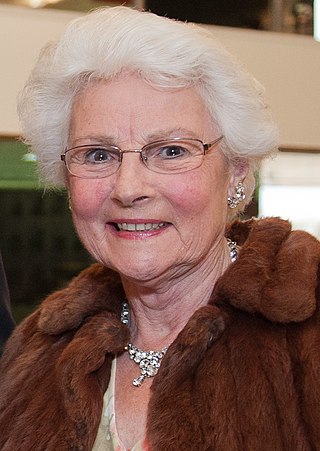
Science fiction fandom or SF fandom is a community or fandom of people interested in science fiction in contact with one another based upon that interest. SF fandom has a life of its own, but not much in the way of formal organization.

Katherine Wilson Sheppard was the most prominent member of the women's suffrage movement in New Zealand and the country's most famous suffragist. Born in Liverpool, England, she emigrated to New Zealand with her family in 1868. There she became an active member of various religious and social organisations, including the Women's Christian Temperance Union New Zealand. In 1887 she was appointed the WCTU NZ's National Superintendent for Franchise and Legislation, a position she used to advance the cause of women's suffrage in New Zealand.

Railway preservation in New Zealand is the preservation of historically significant facets of New Zealand's rail transport history. The earliest recorded preservation attempt took place in 1925, although the movement itself did not start properly until 1960. New Zealand appears to have a higher proportion of organized railway enthusiasts per 1,000 of population than any other part of the world.

ZM is a New Zealand contemporary hit radio network owned by New Zealand Media and Entertainment. It broadcasts 19 markets throughout mainland New Zealand via terrestrial FM, and worldwide via the Internet. The network targets the 15–39 demographic specialises in a chart-music playlist of pop, rock, hip hop and dance music. It reaches approximately 486,800 listeners weekly, making it the fifth largest commercial radio station in New Zealand.

Rail transport in New Zealand is an integral part of New Zealand's transport network, with a nationwide network of 4,375.5 km (2,718.8 mi) of track linking most major cities in the North and South Islands, connected by inter-island rail and road ferries. Rail transport in New Zealand has a particular focus on bulk freight exports and imports, with 19 million net tonnes moved by rail annually, with 99.5% of New Zealand's exports and imports being transported through the country's seaports.

Margaret Elizabeth Austin is a former New Zealand politician. She was an MP from 1984 to 1996, representing first the Labour Party and then briefly United New Zealand.
Rock music in New Zealand, also known as Kiwi rock music and New Zealand rock music, rose to prominence first in 1955 with Johnny Cooper's cover version of Bill Haley's hit song "Rock Around the Clock". This was followed by Johnny Devlin, sometimes nicknamed New Zealand's Elvis Presley, and his cover of "Lawdy Miss Clawdy". The 1960s saw Max Merritt and the Meteors and Ray Columbus & the Invaders achieve success. In the 1970s and early 1980s the innovative Split Enz had success internationally as well as nationally, with member Neil Finn later continuing with Crowded House. Other influential bands in the 1970s were Th' Dudes, Dragon and Hello Sailor. The early 1980s saw the development of the indie rock "Dunedin sound", typified by Dunedin bands such as The Clean, Straitjacket Fits and The Chills, recorded by the Flying Nun record label of Christchurch. New Zealand's foremost hard rock band Shihad started their long career in 1988.

Denis James Matthews Glover was a New Zealand poet and publisher. Born in Dunedin, he attended the University of Canterbury where he obtained a Bachelor of Arts, and subsequently lectured. He worked as a reporter and editor for a time, and in 1937 founded the Caxton Press, which published the works of many well-known New Zealand writers of the day. After a period of service in World War II, he and his friend Charles Brasch founded the literary magazine Landfall, which Caxton began publishing in 1947.

Warp was a New Zealand magazine and official organ of the National Association for Science Fiction (NASF), the country's first national science fiction fan organisation.
The following lists events that happened during 1902 in New Zealand.

The following lists events that happened during 1907 in New Zealand.
The New Zealand National Science Fiction Convention is a volunteer-run science fiction convention that is scheduled annually, and usually takes place either at Easter or at Queen's Birthday weekend. It is usually abbreviated as NatCon.
The following lists events that happened during 1894 in New Zealand.
The following lists events that happened during 1889 in New Zealand.
The political philosophy of anarchism has had a small presence in New Zealand politics.
The New Zealand Society of Authors promotes and protects the interests of New Zealand writers. It was founded as the New Zealand PEN Centre in 1934. It broadened its scope and became the New Zealand Society of Authors in 1994, under the presidency of writer Philip Temple.
The Grand Lodge of New Zealand (NZGL) is the governing body for the freemasons within New Zealand under that constitution. Its full name is "The Grand Lodge of Antient, Free and Accepted Masons of New Zealand". The Grand Lodge of New Zealand was constituted on 30 April 1890, however Freemasonry operated in New Zealand since at least 1837 under the older English, Irish, and Scottish constitutions.
The 1918 War Honours in New Zealand were appointments by King George V to the Order of the British Empire to recognise services in or for New Zealand in connection with World War I. They were announced on 4 October 1918.

Emma Eliza Packe (née de Winton of Christchurch, New Zealand was the founding president of the Christchurch Women's Christian Temperance Union in May 1885 and National President of the Women's Christian Temperance Union New Zealand from 1887 to 1889.










